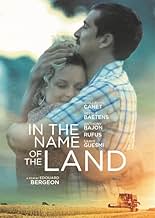A movie dealing with the rural world, a subject which is rarely treated : in the past ,in "Farrebique" and its remake "Biquefarre (1945 and 1983) ,Georges Rouquier depicted his own family ; recently "petit paysan" attracted attention.
"Au nom de la terre" ,against all odds, out of the blue ,was a blockbuster when it was released ,even beating the umpteenth "Rambo" , which was released the same day in France .
Based on a true story ,director Edouard Bergeon's own family ,it's probably the fin de decade masterpiece of the French cinema;I was skeptical about Guillaume Canet cast as a farmer ,but I had to make amends: the actor was a horse -breeders' son and he knew all the tricks of the trade ;his performance in the film is one of his very best ;his metamorphosis is stunning :from the dashing go-getter fresh from Womying where the big herds impress him to the human wreck of the second part ,his facial expressions run the whole gamut from enthousiasm to despair.
The first part is close to documentary :it pits Pierre Jargeau 's modern methods against his dad Jacques (an admirable Rufus )'s old ways ("I started when I was 13 , and I had almost nothing ").Pierre thinks big ,he invests , his farm expand ; the director does not pass over in silence the mistakes :the intensive farming of chickens ,does it replace the fresh eggs you get from hens living in open air?That his wife finds him unconscious in the huge henhouse is revealing.Although there are moments of true happiness (Christmas and a birthday celebration) , it become obvious that his hard labor has taken the best of him (which the wise dad could have predicted); and the debts pile up , life becomes harder and harder till an unexpected disaster ruins all Pierre's hopes.
The second part of the movie is a descent into hell ,showing warts and all with a great sense of decency : the most harrowing moment is perhaps the impossibility for the dirty slovenly dad to attend a wedding: he's no longer part of the society ;and thanks for using a French song instead of the obligatory American ones .In this context ,Barbara's poignant " dis,quand reviendras-tu? " (+tell me,when will you come back?) heard on the beautiful landscapes (lovingly filmed),goes straight to the heart .
May the farmers cease to be victims !

![Regarder Bande-Annonce [VO]](https://m.media-amazon.com/images/M/MV5BZGY0MmUwNjMtYjg2Yy00NmUyLWI5NWMtMDYwZGU3MTI1ZDAwXkEyXkFqcGdeQXRyYW5zY29kZS13b3JrZmxvdw@@._V1_QL75_UX500_CR0)





















